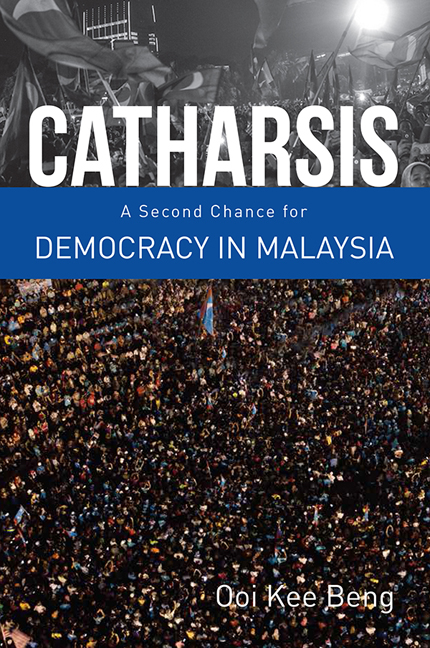Book contents
- Frontmatter
- Contents
- Foreword
- 1 Introduction – Malaysia's Future Is Redeemed
- Before Pakatan Harapan
- Before 9 May 2018
- With Mahathir at the Helm
- 31 One Thing Is Certain—There Will Be More Amendments to the Constitution
- 32 The More Things Change, the More Things May Actually Change
- 33 Did Merdeka Liberate or Create Malaya?
- 34 Interview with Nurul Izzah Anwar: Rebuilding a Nation Long Divided
- 35 The Diminishing of Humans Through Identity Politics
- 36 The Art of Dismantling Cultural Pluralism
- 37 No Need to Let Bigots Dictate Policy
- 38 What the Penang Floods Say About Malaysian Politics (and It's Not Just About Climate Change)
- 39 This is the Moment of Truth for Malaysia's Race-based Politics
- 40 We are Equal Only Through Our Vote
- 41 Why the Opposition Has a Shot at Toppling the Barisan Nasional with Mahathir at the Helm
- 42 Spiralling Back towards Reformasi
- 43 Individual Freedom Is a Matter of National Survival
- 44 Why Meet the Twenty-first Century with Twentieth Century Mindsets?
- 45 A Final Quarrel between a Repentant Grandfather and Oldfashioned Self-absorbed Parents
- 46 Outraged Enough to Go Vote or Cynical Enough to Stay Home?
- Beyond 9 May 2018
- About the Author
33 - Did Merdeka Liberate or Create Malaya?
from With Mahathir at the Helm
Published online by Cambridge University Press: 12 February 2019
- Frontmatter
- Contents
- Foreword
- 1 Introduction – Malaysia's Future Is Redeemed
- Before Pakatan Harapan
- Before 9 May 2018
- With Mahathir at the Helm
- 31 One Thing Is Certain—There Will Be More Amendments to the Constitution
- 32 The More Things Change, the More Things May Actually Change
- 33 Did Merdeka Liberate or Create Malaya?
- 34 Interview with Nurul Izzah Anwar: Rebuilding a Nation Long Divided
- 35 The Diminishing of Humans Through Identity Politics
- 36 The Art of Dismantling Cultural Pluralism
- 37 No Need to Let Bigots Dictate Policy
- 38 What the Penang Floods Say About Malaysian Politics (and It's Not Just About Climate Change)
- 39 This is the Moment of Truth for Malaysia's Race-based Politics
- 40 We are Equal Only Through Our Vote
- 41 Why the Opposition Has a Shot at Toppling the Barisan Nasional with Mahathir at the Helm
- 42 Spiralling Back towards Reformasi
- 43 Individual Freedom Is a Matter of National Survival
- 44 Why Meet the Twenty-first Century with Twentieth Century Mindsets?
- 45 A Final Quarrel between a Repentant Grandfather and Oldfashioned Self-absorbed Parents
- 46 Outraged Enough to Go Vote or Cynical Enough to Stay Home?
- Beyond 9 May 2018
- About the Author
Summary
Sixty years may have passed since Merdeka Day, but its historical significance remains something we continue to debate.
Did Malaya fight to free itself from an implacable Britain? Did the British offer independence to its colonies in South-East Asia to suit its own ends? Was there a Malaya that now threw off the shackles of Pax Britannia's global hegemony? Or was Malaya something novel, grown out of generations of colonial conveniences?
In short, the key question is: ‘Was there a Malaya that on 31 August 1957, was liberated and granted independence? If there already was a Malaya, in what sense was there one? Or was it created that day? If it was created that day, what were the ingredients – physical and cultural – that went into the concoction?’
The Legal Malaya
The trouble taken to so carefully craft a national constitution under the oversight of an international commission would suggest that a new polity was in fact being judiciously brought into being and that nothing like it had existed before. Seen that way, the constitution was the outlining of a new entity we would now call the Federation of Malaya, an act of definition in fact that was geared towards immediate membership in the UN.
Already on 17 September 1957, the country became the eightyfirst member of the United Nations. Needless to say, most of those members who came later and many of those who went before were in fact new countries, generated and necessitated by the fall of empires and of colonies throughout the twentieth century.
Gaining political existence in a form that would gain the country immediate membership to the UN was a basic deliberation in the crafting of the Malayan Constitution. What qualities a country should essentially possess for it to be a potential member were what the lawyers and politicians involved in crafting the document were trained to consider.
The UN has 193 members today, up from 80 before 31 August 1957, 60 years ago. How so many diverse societies in the world could over just a few decades after the demise of the imperial principle of human organisation take on the strict stock character of the nationstate, explains much of the global troubles that we live with today – not only in Malaysia but throughout the world.
- Type
- Chapter
- Information
- CatharsisA Second Chance for Democracy in Malaysia, pp. 119 - 121Publisher: ISEAS–Yusof Ishak InstitutePrint publication year: 2018

